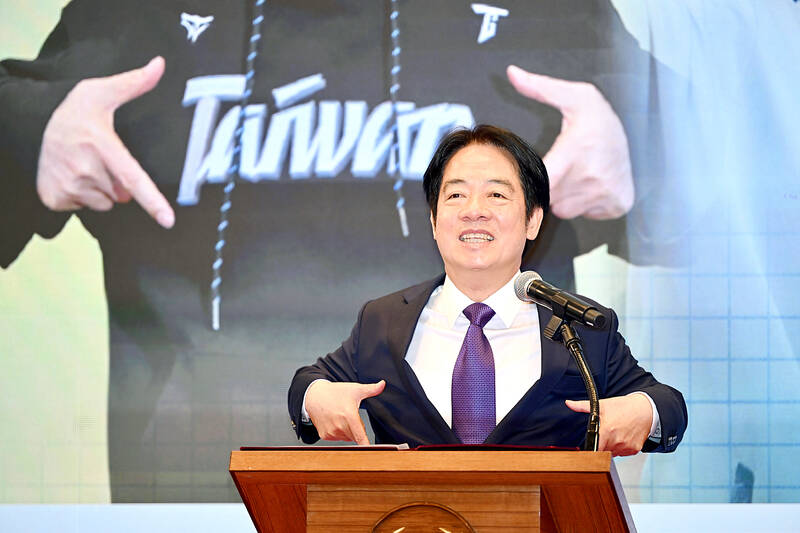President William Lai (賴清德) yesterday urged parties across the political divide to democratically resolve conflicts that have plagued domestic politics within Taiwan’s constitutional system.
In his first New Year’s Day address since becoming president on May 20 last year, Lai touched on several issues, including economic and security challenges, but a key emphasis was on the partisan wrangling that has characterized his first seven months in office.
Taiwan has transformed from authoritarianism into today’s democracy and that democracy is the future, Lai said.

During his New Year’s Address at the Presidential Office in Taipei yesterday morning, President William Lai gestures in front of an image of himself performing a similar gesture highlighting “Taiwan” on his shirt.
Photo: Lo Pei-de, Taipei Times
“No matter what threats and challenges Taiwan faces, democracy is the only path for Taiwan,” he said. “The only choice is to keep moving forward without looking back.”
Although political party competition is part of the democratic system, “domestic political disputes should be resolved under a democratic approach within the country’s constitutional system,” he said.
However, Lai said that the government and the public have the right to oppose moves by the legislature.
The Constitution says that the Executive Yuan has the right to reject a law passed by the legislature by asking the lawmaking body to reconsider it, or, once the law takes effect, by taking it to the Constitutional Court for adjudication, he said.
People also have the right of “election, recall, initiative and referendum,” enabling them to exercise greater democratic power and show that the people are the source of political legitimacy, he said.
Lai’s comments came as his ruling Democratic Progressive Party (DPP) battles the Chinese Nationalist Party (KMT) and the Taiwan People’s Party (TPP) in the legislature, which together have a majority of seats.
TPP lawmakers have sided with the KMT on legislation that the DPP has opposed, including three bills passed last month that the Cabinet has said it would ask the legislature to reconsider.
The bills, which triggered scuffles in the legislature, cover new measures that tighten recall petition requirements, curb the Constitutional Court’s ability to rule on cases and change central government revenue allocations.
Premier Cho Jung-tai (卓榮泰) said that the Cabinet would take action to counter them, as the three packages are “difficult to implement.”
Later, during a news conference following his New Year’s address, Lai was asked by reporters whether he would invite opposition party leaders for a “reconciliation coffee.”
He said he plans to invite Legislative Speaker Han Kuo-yu (韓國瑜) of the KMT to the Presidential Office for a meeting before Han departs on a trip to attend US president-elect Donald Trump’s inauguration.
In his address at the Presidential Office, Lai said that his government would continue to boost Taiwan’s economic resilience and its integration into global supply chains.
Taiwan would use its strengths in semiconductors and artificial intelligence to deepen the resilience of the “democratic” supply chain, he said.
Through international cooperation, Taiwan would emphasize collaboration in several fields, ranging from drones, low Earth orbit satellites and robots, for the defense, safety and security, biotech, pharmaceutical and green sectors, he said.
Lai called for unity among Taiwanese, regardless of their political differences, so that governments at all levels can enact policies that are beneficial and help Taiwan “continue to walk down the right path.”
Source: Taipei Times - 2025/01/02




















